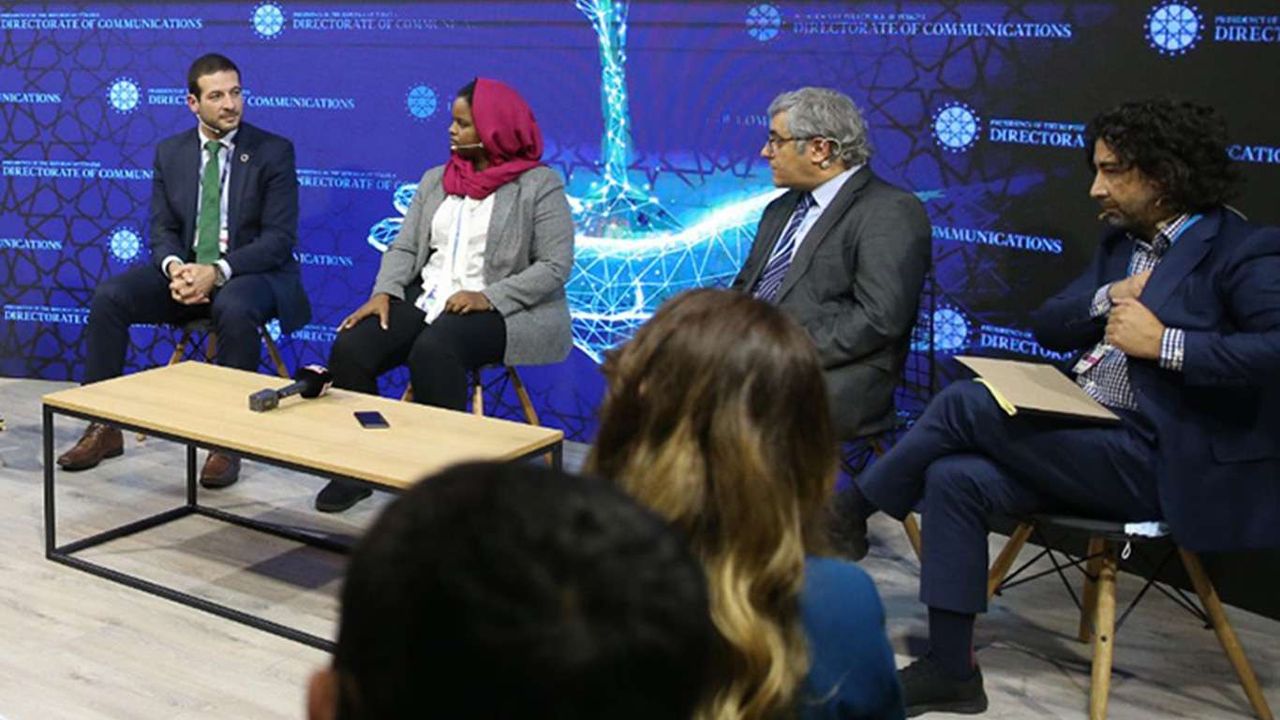As part of the 26th Conference of the Parties to the United Nations Framework Convention on Climate Change (COP26), the Presidency's Directorate of Communications held a panel titled “Turkey"s Green Development Strategy: An Inclusive, Sustainable and Humanitarian Vision” in Glasgow, Scotland.
In a post shared on his Twitter account regarding the panel, Director of Communications Fahrettin Altun said, “As the Directorate of Communications, we hosted the 'Turkey"s Green Development Strategy: An Inclusive, Sustainable and Humanitarian Vision" panel in Glasgow as part of the UN Climate Change Conference. Through this panel, our country's Green Development Initiative vision was once again highlighted.”
Climate change, green development, climate crisis, sustainable development, zero waste, environmental protection, responsible production and consumption, the agenda of the COP26, environment-centered policies, and Turkey"s green development goals were discussed in the panel.
Prof. Oktay Tanrısever from Middle East Technical University, Assoc. Prof. Kılıç Buğra Kanat, Research Director at the SETA Foundation in Washington DC, Nisreen Elsaim, Chair of UN Secretary General's Youth Advisory Group on Climate Change, and Associate Fellow Karim Elgendy from Chatham House Environment and Society Program spoke on the panel, which was moderated by TRT World Anchor Selina Downes.
Karim Elgendy, Associate Fellow from Environment and Society Programme at Chatham House, a think-tank in the UK, said about the impacts of climate change in Turkey, “Turkey is on the Mediterranean, and the Mediterranean has this unique geographic condition that means it's affected differently by climate change than everyone else. In other words, it will get less precipitation.”
Noting that a rise in average temperature and less precipitation in Turkey was already expected, Elgendy said, “These two things together mean they get more desertification and also creates conditions for erosion, which is a real issue in Turkey, which is why Turkey is trying to add more forests and put those in place to avoid that erosion.”
“Turkey"s efforts are quite impressive by all standards”
Indicating that Turkey had taken steps to achieve net-zero emissions, Elgendy stated, “Turkey has made quite significant efforts on renewables. The solar and wind potential has tripled in the last few years. There's been a massive surge in overall renewables. I think Turkey"s share of renewables is more than 50 percent this year, which is quite impressive by all standards.”
Pointing out that Turkey had quite an ambitious target for 2023 for forestation, Karim Elgendy said, “By being eligible for some funding, Turkey will do much more than just renewables, zero waste projects, and forestation.”
“More than 5.6 million people are very much threatened by dying from hunger and malnutrition”
Elsaim, Chair of UN Secretary General's Youth Advisory Group on Climate Change, remarked that climate change was occurring not only in Turkey, but throughout the world, giving an example from Africa.
Emphasizing that more than 11 countries had announced emergency because of floods in Africa, in 2020, Elsaim said, “Sudan was one of them. We had the worst flood in 100 years, and this year, ironically, seven countries announced emergency, but because of the opposite exactly, droughts. So, seven countries are facing drought this year. More than 5.6 million people are very much threatened by dying from hunger and malnutrition.”
Elsaim underlined that climate change was, therefore, not just the extreme weather event but the implication of this extreme weather event on the infrastructure, water security and food security, as well as economy.
Pointing out that climate change would force people to migrate, Elsaim concluded her words with the following:
“For example, Bangladesh will lose a third of its land because of the rise of the sea level, and it's a very small country with a very big population. So, what are these people who lost a third of their land going to do? Migrate. This is the only solution they will have. Not only Bangladesh, all of the small island states. The Maldives has a population of almost 12 million. And what will happen when the Maldives is going to be underwater? They will have to migrate.”
“I think Turkey will realize its great potential in green industrial development strategy in the future”
METU Faculty Member Prof. Oktay Tanrısever indicated that Turkey was aware of the challenges posed by climate change, and continued, “This is because Turkey is located at a very difficult part of the world. It is affected by deforestation and also climate change in terms of the effect of increased temperature on biodiversity. And also, we have seen the impact of that on water resources. Turkey has been dealing with these challenges individually.”
Noting that the interest in dealing with climate change took a more systemic and comprehensive approach after the international community developed a common approach to this, Prof. Tanrısever said, “Turkey was a vocal supporter of that right from the beginning. Turkey had to deal with diplomatic challenges because it was a member of OECD.”
Pointing out that Turkey as a candidate country for EU membership had to align its climate strategy with that of the EU, Prof. Tanrısever said, “Also, I believe Turkey, as a regional power, could present this success story in its close neighborhood, from the Caucasus to Central Asia, to some of the Middle Eastern countries and the Balkan countries, and also parts of the Black Sea region. I think Turkey will realize its great potential in green industrial development strategy in the future and its neighbors will also benefit from that.”
Emphasizing that young people in Turkey were engaged in the fight against climate change, Prof. Tanrısever said, “In all universities, we have a climate representative and there are more environment-friendly solutions for transportation and other aspects. And we have seen young people very aware of these climate policies. Our students are in close contact with the rest of the world. There are different exchange programs and our students are part of various youth programs on the environment, energy and also climate issues. So, I am very hopeful about the Turkish youth and they have this awareness and also willingness to solve these problems.”
Example of domestically-produced electric car
Prof. Tanrısever referred to Turkey"s development of a fully electric car among as an example of the country"s efforts to achieve net zero emissions. Noting that when Turkey produced these technologies cheaper, it would share that with its partners in neighboring countries in Central Asia, the Black Sea, the Balkans, the Caucasus, and the Middle East, Prof. Tanrısever continued as follows:
“They will also have access to these technologies. Turkey has been investing in this technology. So, it is not only about energy transition, but also the development of new technologies, which could produce novel solutions which are more environmentally friendly. I think Turkey is on the right track.”
Pointing out that Turkey was taking steps, especially in waste management, renewable energy and expansion of forests, Assoc. Prof. Kılıç Buğra Kanat, Research Director at the SETA Foundation in Washington DC, said, “But internationally, especially after the global pandemic, we started to feel that everybody is in the same boat. The sensitivity about global problems increased rapidly. Türkiye was taking steps, but starting from last year, they started to increase their focus and especially the forest fires, floods around the world raised the idea that we need global cooperation about this as well.”
Drawing attention to the migration to be caused by climate change, Assoc. Prof. Kanat said, “Climate refugees would be different from the current refugee crisis that we have. Countries are accepting those refugees in temporary status, and there is always hope that the conflict will end, there will be some kind of reconstruction and they will go back to their homes. But climate refugees will be permanent refugees. There will be nowhere they could go. It would not only destroy their life but the culture, society and communities over there as well. In the Syrian refugee crisis, actually, for 10 years, the international community could not prepare an action plan. How will they deal with this (climate migration)? And we are talking about climate refugees, which would likely take place in different parts of the world at the same time.” (ILKHA)









